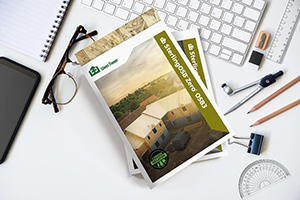All West Fraser’s Oriented Strand Board (OSB) products are manufactured using selected fibres of timber that are laid in cross directional layers and mechanically pressed to form a structurally-engineered panel, designed for construction and other industrial applications. OSB is viewed by many as the natural successor to plywood because it is more eco-friendly, is home produced and far more affordable, while it contains none of the voids or knots which have historically weakened plywood.
As the boards are essentially formed from individual strands of softwood, some may question their strength and durability, especially if exposed to inclement weather, but this is a misunderstanding of OSB’s characteristics.
West Fraser’s SterlingOSB Zero OSB3, for example, is BBA-certified, as well as approved for load bearing in humid conditions – being manufactured to EN300 and EN 13986. However, if being used outdoors for extended periods, it can be painted or varnished, plus it can also be treated to protect against fungal and insect attack.
Technological advances mean there is no need to sand OSB boards anymore, as West Fraser is now able to produce them to industry leading tolerances. The latest boards offer an exceptionally smooth surface, making it an ideal substrate which is easy to work with.
If a floating floor is specified, the installer should ensure that battens for the substructure are appropriately spaced at 400mm centres beneath 15mm boards and up to 600mm for the 18mm version. SterlingOSB Zero boards come in both square edged and tongue and groove (T&G) format, which can be used for roofing and timber frame construction, as well as flooring – making the whole SterlingOSB Zero range infinitely flexible in use.
Check out the West Fraser housebuilders’ page https://uk.westfraser.com/housebuilders/ for useful downloads and product information.
For further information, call 01786 812 921 or visit www.uk.westfraser.com

